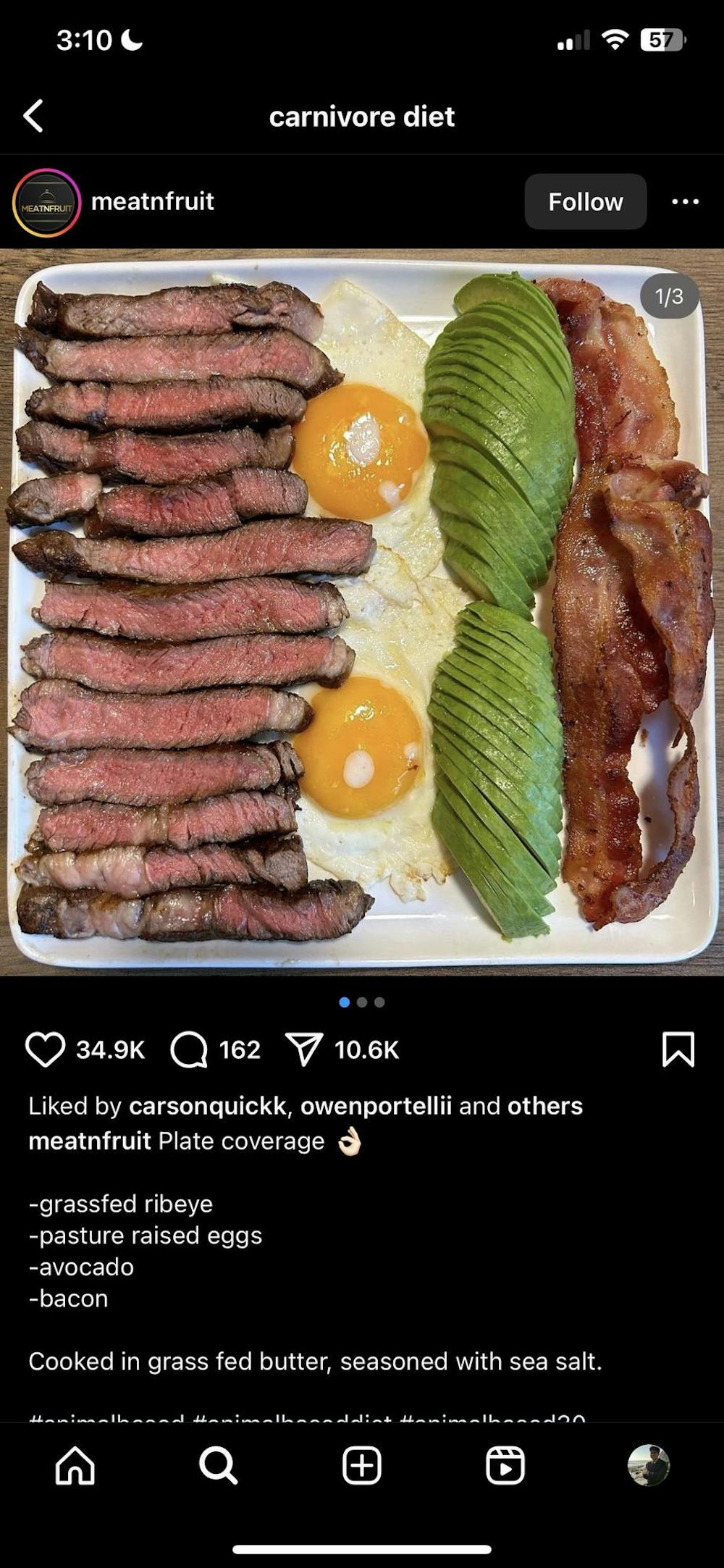The masculine urge to stop eating highly-processed foods and maintain a diet of just grass-fed steak, pasture-raised eggs, avocado and bacon strips. I write this article as a sequel titled “The masculine urge to …”— it serves as a continuation of the social commentary of masculine urges but situated within the theme of my articles thus far this semester.
Often, is it the case that masculine urges are overlooked or undermined by personal deliberation or public opinion. As I have argued before, the masculine urge to drop everything, move out west and live off the grid for the remainder of my life is one that has been a recurring desire for quite some time. In the past, I have overlooked this desire, wrongly viewing it as some sort of odd inclination to be poor and apostatize my devotion to the “god of money.” Likewise, many people, namely the federal government and the University of Notre Dame, would disapprove of my desire as it would reduce their tax revenue and donation base by a single individual. Whatever the case, it would be difficult to find an instance where a masculine urge is generally espoused by the public opinion. If one seems to find an instance, that masculine urge is probably not masculine.
The urge to eat a carnivore-esque diet is one that has gained tremendous popularity among men in recent years. It is difficult to ascribe a singular name, but the desire is broadly described as one where the person eats strictly whole foods, primarily red meat, eggs, fruits and things of similar type. I will use this paradigm to explain the development of masculine urges. Firstly, it is important to say that the actual execution, or practice, of this mode of eating is probably poor nutritional advice. I am concerned both from a financial standpoint and a gastrointestinal one. I seriously wonder how these men afford those groceries, have regular bowel movements or do not suddenly die from a stroke or heart attack. Despite the impracticalities, these men tout the benefits from this kind of diet, which are admittedly undeniable.
Similar to the masculine urge to move out west and live on a ranch, the impracticalities are obvious but the desire itself is where the merit lies. I do believe it is a good thing that men are taking more of an active role in attempting to have a healthier lifestyle. It is not so much of a rejection of consumerism and “Big Food” as it is a pursuit of what is or seems to be true and authentic. Men hate being told what to do, but they, and all humans, are intrinsically self-interested, which lends itself well to a lifestyle and diet that is apparently beneficial and allows them to have maximum jurisdiction.
Throughout all my articles, I have consistently pointed to the fact that all people, and especially men in this case, are in constant pursuit of what is true, good and beautiful. It is not unknown what will actually satisfy and fulfill this ever-needy heart, but we often find ourselves settling for less than what we deserve. So yes, maybe it is not so far-fetched that men are hesitant of being trapped in an existence of being enslaved and poisoned on the daily. In light of this, I am more hopeful for human happiness than I was back when I wrote my first article about the masculine urge. There seems to be more subtle, manageable ways of pursuing authenticity, which is evidently rising in popularity.
It is important to note that the defiant element of the human man ought to be balanced with the element that compels man to pursue good. For, if one defiant element overtook the other, then we might find a riot break out in the dining halls on account of the highly-processed, highly-caloric foods. We might also find coalitions of men using their hall’s grills and budget to cook steaks for sale for the entire Notre Dame populace, though I wouldn’t be opposed to this actually. If men placed more attention in pursuing what is good, then you might find a culture where men take personal accountability for their actions: from how they eat to how they live. It would happen that these kinds of men got their lives in order before they began foolishly espousing some sort of trend or fad. I believe in and hope for this culture of authenticity.
In my personal experience, I have not quite made the jump to indulging the masculine desire to eat just grass-fed steak, pasture-raised eggs, avocado and bacon strips, but I do see glimpses of where my other masculine urges are at work. For one, my inclination to disconnect from social media and be present with myself in nature is a hopeful sign. I am beginning to enjoy the simple things more, from walking on a leafy sidewalk on a cool autumn afternoon to picking up and chucking small rocks into a lake, which is admittedly quite entertaining. These sorts of developments can happen in anyone — it just takes a mind conscious enough to desire the desire to want what is good in life. I have faith in all of you, my readers. These masculine urges are not necessarily masculine in the sense of designating sex, so I wish to redefine the masculine urge to mean a desire to pursue what is authentic: what is true, good and beautiful. And so, if you genuinely have a masculine urge of this sort, you would be foolish not to act on it.
Jonah Tran is a senior at Notre Dame studying finance and classics. He prides himself on sarcasm and never surrendering. You can file complaints to Jonah by email at jtran5@nd.edu.










